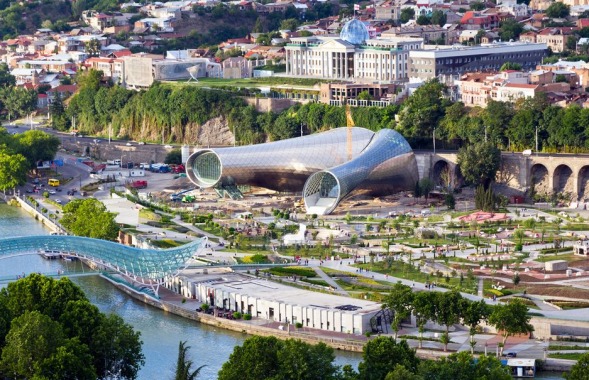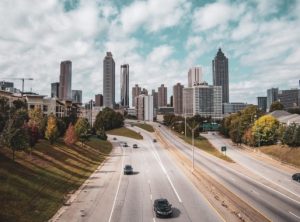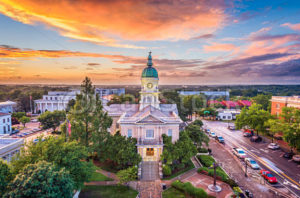Tbilisi is the capital and largest city of Georgia, located on the banks of the Kura River with a population of about 1.1 million people. The city was founded in the 5th century. Tbilisi is the most important industrial, social and cultural center of Georgia.
Warnings & Dangers in Tbilisi

OVERALL RISK : LOW
Tbilisi is considered one of the safest cities in the region. The crime rate is low here. You should beware of the outskirts of the city and watch your belongings, especially during the holidays.

TRANSPORT & TAXIS RISK : LOW
Public transport is well-developed and safe. Taxis are convenient for getting around, but sometimes drivers can rip off tourists at exorbitant prices. Make sure the taxi has a taximeter.

PICKPOCKETS RISK : LOW
Like any major city in Tbilisi, pickpockets do happen. Especially on public transport during rush hour. Keep track of your belongings and do not leave bags and wallets unattended on the tables in the cafe.

NATURAL DISASTERS RISK : LOW
The city is not subject to any serious risks of natural disasters.

MUGGING RISK : LOW
The risk of serious robbery and armed attacks is very low in Tbilisi. There is little danger of these attacks in the suburbs. However, the likelihood that you will be attacked is very small.

TERRORISM RISK : LOW
The risk of terrorism is low in Tbilisi. Of course, the risk of attacks still exists, due to the international position of the city. The global risk of terrorist attacks in public areas exists worldwide, so tourists should be vigilant.

SCAMS RISK : LOW
Fraud is commonly associated with street vendors offering counterfeit goods to tourists. Don't buy them even if the price is very attractive. Also, only withdraw money from ATMs at banks with cameras to avoid skimming your card.

WOMEN TRAVELERS RISK : LOW
Women traveling alone can feel quite safe in Tbilisi. The main thing is to adhere to the usual precautions and monitor your surroundings.
How Safe Is Tbilisi for Tourists?
Tbilisi is a very safe city to travel to.
The crime rate is meager here; the main problems are associated with petty theft and vandalism.
Tbilisi is now considered a very safe city.
The police system has been completely reformed, and recent polls show that public confidence in the police has changed from nearly 10% to 88%.
The police usually react quickly, although usually, only Georgian and English are spoken.
The locals are very hospitable and friendly.
While walking is generally good, it makes sense even for single women to take a bus or taxi home.
Use common sense and big-city awareness.
Try not to get involved in drunken arguments and showdowns with locals.
It is also best to avoid topics about politics.
As in any European capital, pickpockets and minor accidents happen here.
However, if you keep your common sense and keep an eye on your belongings and surroundings, this is unlikely to affect you.
Be especially careful on the road if you are a pedestrian or driving.
Often the traffic on the roads can be chaotic, and drivers drive right-hand drive cars, despite the fact that the traffic is also right-sided.
This can be dangerous for all road users.
Do I Need a Visa to Visit Tbilisi?
Visitors to Georgia must obtain a visa from Georgian diplomatic missions unless they come from one of the visa-exempt countries. or one of the countries whose citizens can obtain an e-Visa. A valid passport is a must.
Which Currency Is Used in Tbilisi?
The currency in Georgia is the Georgian Lari. Although prices are occasionally quoted in US dollars and euros, Georgian law requires that all goods and services are paid for in local currency.
How's the Weather like in Tbilisi?
The summers are warm and mostly clear; the winters are long, icy, and partly cloudy; and it is dry year-round. Therefore, the best time to visit Tbilisi is May-June.
What Do I Need to Know about Airports in Tbilisi?
Tbilisi International Airport, named after Shota Rustaveli, is the main airport in Georgia, located near the capital Tbilisi on the eastern side.
Should I Get Travel Insurance for My Travels?
A travel insurance policy is a must when visiting a foreign country or city. Make sure you got it before starting your journey; the customs officer may ask for it.
What Are Some Things to Do in Tbilisi?
In Tbilisi, the influence of other cultures, in particular Persian and Russian, is very noticeable. Cobbled streets, Orthodox churches, whimsically decorated Art Nouveau buildings, and architectural monuments of Soviet modernism – all this is Tbilisi. Above it rises the mountain fortress Narikala, built in the IV century and now reconstructed, and a symbol of Tbilisi, Georgia in general and the hospitality of the Georgian people – the Mother Kartli monument.
Is the Water in Tbilisi Safe to Drink?
Tap water is safe to drink.
Is Uber Safe in Tbilisi?
There is an Uber taxi in the city; you can call a taxi from your smartphone application. The fare will depend on the time of day and the distance traveled.




